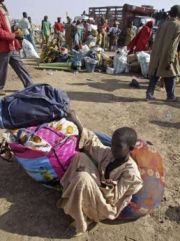China urges Sudan to seek peace in Darfur
March 7, 2008 (BEIJING) — China has urged Sudan to do more to stop fighting in Darfur and speed the arrival of more peacekeepers, Beijing’s envoy on the crisis said, defending his country as a diplomatic bridge to help end the bloodshed.
 China has faced widespread Western criticism that it has not used its oil, arms and business stakes in Sudan to press for an end to deadly havoc in the vast, arid Darfur region.
China has faced widespread Western criticism that it has not used its oil, arms and business stakes in Sudan to press for an end to deadly havoc in the vast, arid Darfur region.
But back from talks in Khartoum and other capitals, Beijing envoy Liu Guijin on Friday defended his country as “working hard” on Sudan and others to end fighting, and said China could serve as a go-between bringing peace closer.
Departing from Beijing’s usually vague language on Darfur, Liu called the violence there a “humanitarian disaster” that had “forced millions from their homes and, in particular, claimed the lives of tens of thousands”.
Liu told a news conference that uncompromising rebel groups also bore blame, but said Sudan’s government had top responsibility for stopping the killing. He also urged Khartoum to give ground on disputes holding up full deployment of UN-African Union peacekeepers.
“I conveyed China’s grave concerns about the deterioration of conditions in western Darfur,” Liu said of his recent meetings with President Omar Hassan al-Bashir and other top Sudanese officials.
MILLIONS FLEE HOMES
International experts estimate some 200,000 have died and 2.5 million have been forced to flee homes in Darfur since conflict erupted in 2003 when rebels took up arms against the central government. The government has mobilised mainly Arab militias to quell the revolt.
China’s role has come under renewed attention since film director Steven Spielberg quit as an artistic adviser to the 2008 Beijing Olympics, saying China had failed to use its sway in Khartoum to seek peace. China is a big investor in Sudan’s oil and its largest weapons supplier.
Liu’s comments showed the difficult balance Beijing seeks on Darfur — rejecting claims that it has not done enough, defending its economic stakes, and seeking progress towards peace as the fighting and the August Olympics keep China’s role under the international spotlight.
He rejected using economic sanctions against Sudan but said Beijing had “fundamentally the same” stance on Darfur as Western powers and showed glints of growing impatience with Khartoum.
“The Sudanese government should be more flexible on some unresolved issues, on some issues where it has made concessions but could give more ground,” he said.
Sudan has accepted the deployment of a 26,000-strong UN-African Union force, but only 9,000 troops are on the ground.
Liu said several disputes between Sudan and other governments blocking the hybrid force had been solved.
To clear remaining ones, he said, Khartoum should show “greater flexibility”, including on accepting Thai and Nepali troops. Western powers should heed “reasonable” Sudanese concerns and press rebels to the negotiate, he added.
(Reuters)
